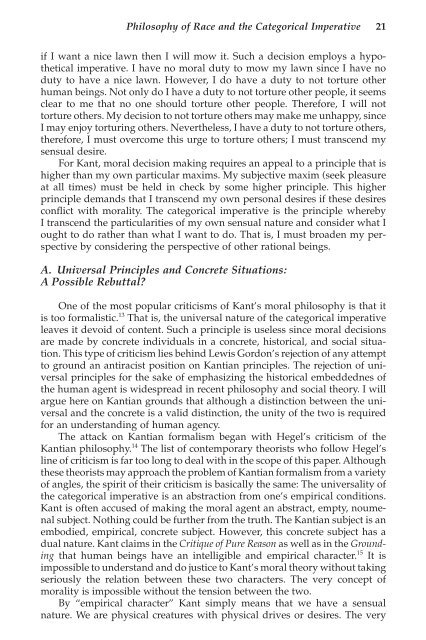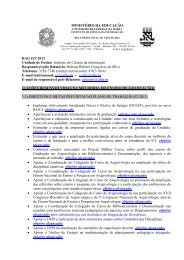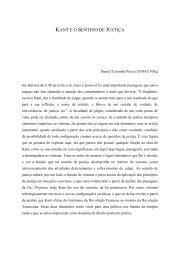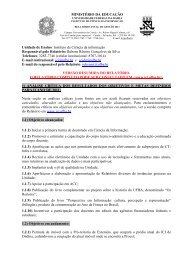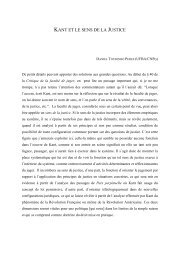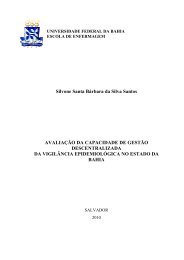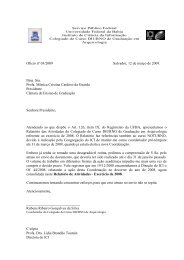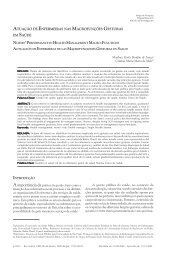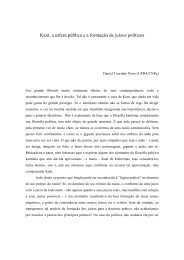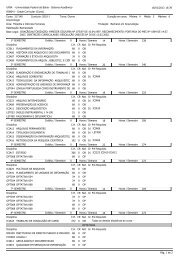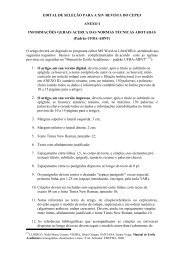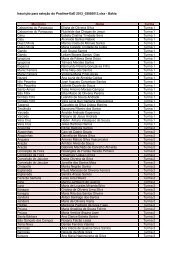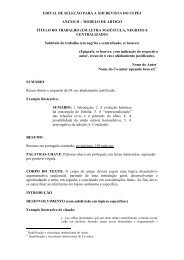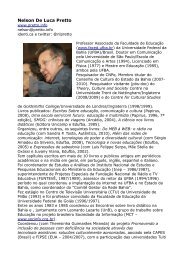Can a Philosophy of Race Afford to Abandon the Kantian ...
Can a Philosophy of Race Afford to Abandon the Kantian ...
Can a Philosophy of Race Afford to Abandon the Kantian ...
- No tags were found...
Create successful ePaper yourself
Turn your PDF publications into a flip-book with our unique Google optimized e-Paper software.
<strong>Philosophy</strong> <strong>of</strong> <strong>Race</strong> and <strong>the</strong> Categorical Imperative 21if I want a nice lawn <strong>the</strong>n I will mow it. Such a decision employs a hypo<strong>the</strong>ticalimperative. I have no moral duty <strong>to</strong> mow my lawn since I have noduty <strong>to</strong> have a nice lawn. However, I do have a duty <strong>to</strong> not <strong>to</strong>rture o<strong>the</strong>rhuman beings. Not only do I have a duty <strong>to</strong> not <strong>to</strong>rture o<strong>the</strong>r people, it seemsclear <strong>to</strong> me that no one should <strong>to</strong>rture o<strong>the</strong>r people. Therefore, I will not<strong>to</strong>rture o<strong>the</strong>rs. My decision <strong>to</strong> not <strong>to</strong>rture o<strong>the</strong>rs may make me unhappy, sinceI may enjoy <strong>to</strong>rturing o<strong>the</strong>rs. Never<strong>the</strong>less, I have a duty <strong>to</strong> not <strong>to</strong>rture o<strong>the</strong>rs,<strong>the</strong>refore, I must overcome this urge <strong>to</strong> <strong>to</strong>rture o<strong>the</strong>rs; I must transcend mysensual desire.For Kant, moral decision making requires an appeal <strong>to</strong> a principle that ishigher than my own particular maxims. My subjective maxim (seek pleasureat all times) must be held in check by some higher principle. This higherprinciple demands that I transcend my own personal desires if <strong>the</strong>se desiresconflict with morality. The categorical imperative is <strong>the</strong> principle wherebyI transcend <strong>the</strong> particularities <strong>of</strong> my own sensual nature and consider what Iought <strong>to</strong> do ra<strong>the</strong>r than what I want <strong>to</strong> do. That is, I must broaden my perspectiveby considering <strong>the</strong> perspective <strong>of</strong> o<strong>the</strong>r rational beings.A. Universal Principles and Concrete Situations:A Possible Rebuttal?One <strong>of</strong> <strong>the</strong> most popular criticisms <strong>of</strong> Kant’s moral philosophy is that itis <strong>to</strong>o formalistic. 13 That is, <strong>the</strong> universal nature <strong>of</strong> <strong>the</strong> categorical imperativeleaves it devoid <strong>of</strong> content. Such a principle is useless since moral decisionsare made by concrete individuals in a concrete, his<strong>to</strong>rical, and social situation.This type <strong>of</strong> criticism lies behind Lewis Gordon’s rejection <strong>of</strong> any attempt<strong>to</strong> ground an antiracist position on <strong>Kantian</strong> principles. The rejection <strong>of</strong> universalprinciples for <strong>the</strong> sake <strong>of</strong> emphasizing <strong>the</strong> his<strong>to</strong>rical embeddednes <strong>of</strong><strong>the</strong> human agent is widespread in recent philosophy and social <strong>the</strong>ory. I willargue here on <strong>Kantian</strong> grounds that although a distinction between <strong>the</strong> universaland <strong>the</strong> concrete is a valid distinction, <strong>the</strong> unity <strong>of</strong> <strong>the</strong> two is requiredfor an understanding <strong>of</strong> human agency.The attack on <strong>Kantian</strong> formalism began with Hegel’s criticism <strong>of</strong> <strong>the</strong><strong>Kantian</strong> philosophy. 14 The list <strong>of</strong> contemporary <strong>the</strong>orists who follow Hegel’sline <strong>of</strong> criticism is far <strong>to</strong>o long <strong>to</strong> deal with in <strong>the</strong> scope <strong>of</strong> this paper. Although<strong>the</strong>se <strong>the</strong>orists may approach <strong>the</strong> problem <strong>of</strong> <strong>Kantian</strong> formalism from a variety<strong>of</strong> angles, <strong>the</strong> spirit <strong>of</strong> <strong>the</strong>ir criticism is basically <strong>the</strong> same: The universality <strong>of</strong><strong>the</strong> categorical imperative is an abstraction from one’s empirical conditions.Kant is <strong>of</strong>ten accused <strong>of</strong> making <strong>the</strong> moral agent an abstract, empty, noumenalsubject. Nothing could be fur<strong>the</strong>r from <strong>the</strong> truth. The <strong>Kantian</strong> subject is anembodied, empirical, concrete subject. However, this concrete subject has adual nature. Kant claims in <strong>the</strong> Critique <strong>of</strong> Pure Reason as well as in <strong>the</strong> Groundingthat human beings have an intelligible and empirical character. 15 It isimpossible <strong>to</strong> understand and do justice <strong>to</strong> Kant’s moral <strong>the</strong>ory without takingseriously <strong>the</strong> relation between <strong>the</strong>se two characters. The very concept <strong>of</strong>morality is impossible without <strong>the</strong> tension between <strong>the</strong> two.By “empirical character” Kant simply means that we have a sensualnature. We are physical creatures with physical drives or desires. The very


